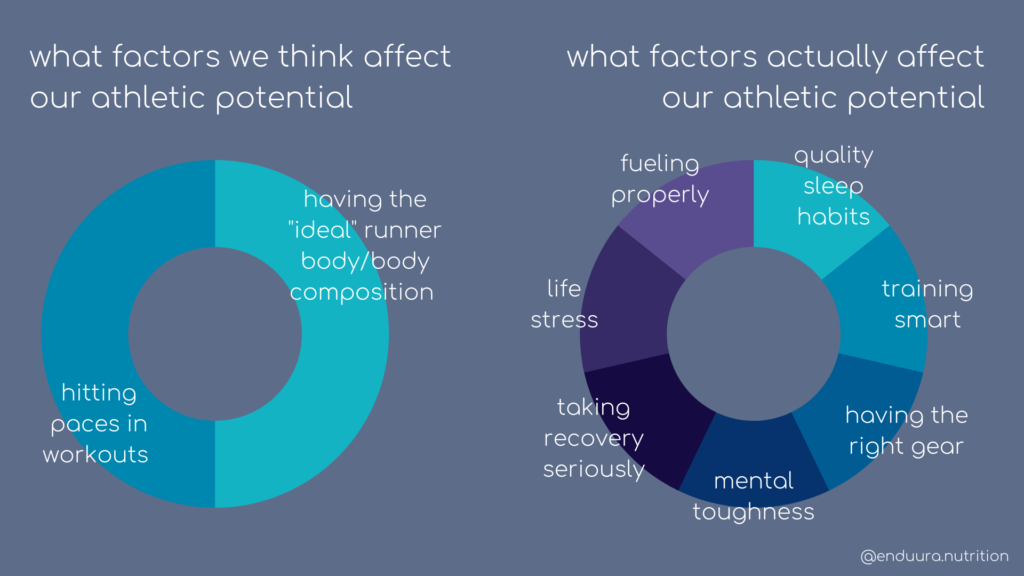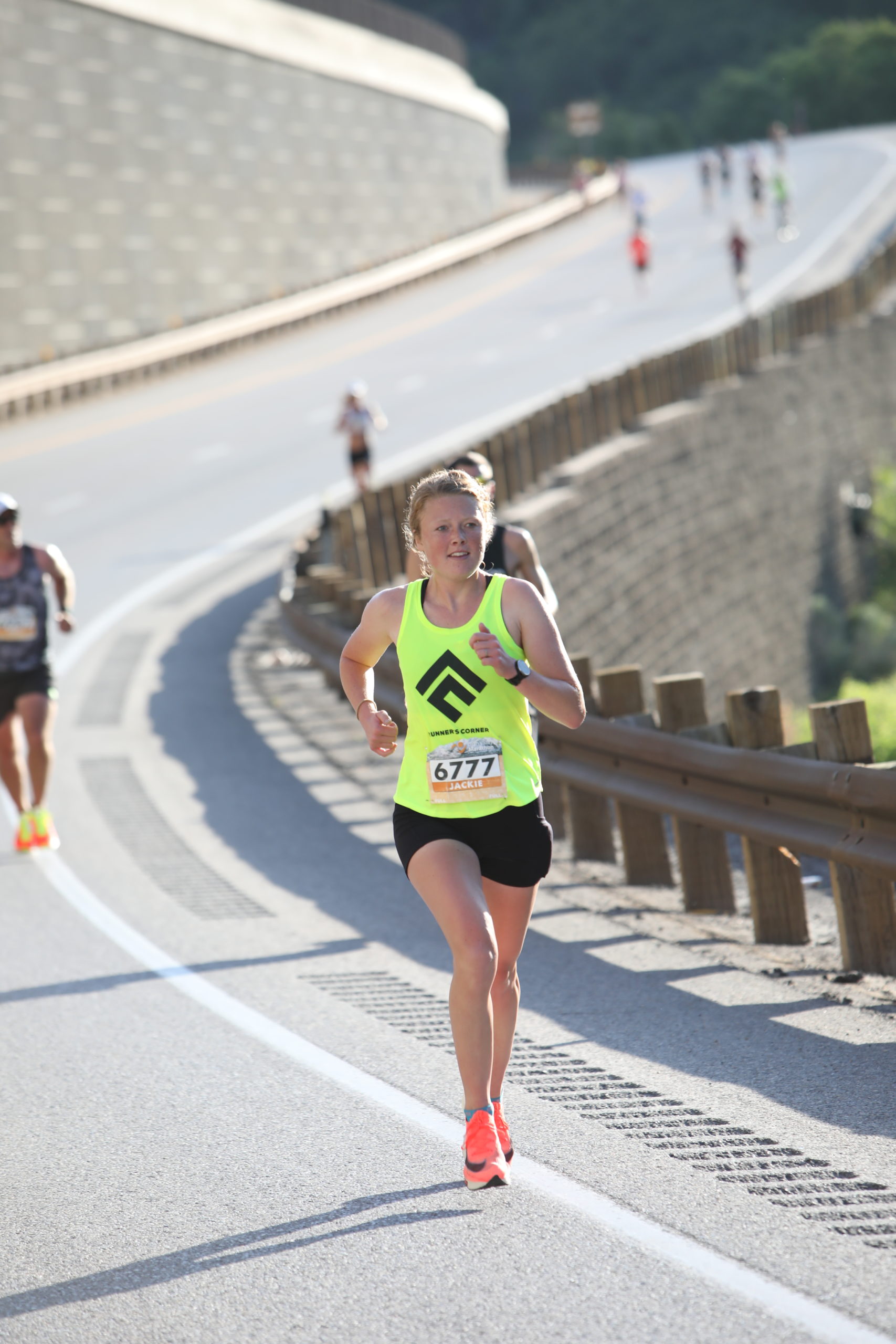Race Weight: What It Is and What It Is Not

Ever heard fellow endurance athletes talk about “race weight?” If so, the conversation probably went something like this.
- “I’ve really got to shed some pounds before my upcoming race this month.” or
- “I bet I could get a personal best if I just lost a few pounds during this next training cycle.” or
- “I guess I’ll never get faster since I’ve gained x amount of pounds.”
Most of the time, our perception of “race weight” puts a heavy emphasis on our body’s weight as it correlates to our athletic performance, as if it is the sole determinant of our success. While body weight is certainly a factor to consider in our pursuit of personal bests, it’s important to understand what “race weight” is, how to find it, and how to get there before overemphasizing this one aspect of your athletic performance.
What Is “Race Weight” Anyways?
“Race weight” is a term that refers to the weight range at which your body will swim, bike, and run optimally. Yes, you read that correctly, your race weight is more of a RANGE than a set number. Our bodies naturally fluctuate a few pounds here or there based on water retention/losses, phase of menstrual cycle (for biological females), appetite (or lack thereof) following hard workouts, bloating, etc.
Your individual race weight range will be unique to you and your personal genetic code. Even two people measuring the same height may have varying race weights based on their bone structure, muscle mass, and natural set point. This range is NOT static, and will likely change through different phases of your life from puberty to childbirth to menopause, and eventually due to the natural effects of aging.
Furthermore, changes in training may cause you to gain or lose muscle mass and will subsequently affect your weight range. Narrowly looking at weight as your only marker of physical fitness leaves out the picture of your body composition as a whole. In a nutshell, just because you’ve lost weight doesn’t mean you’ll be performing better, and just because you’ve gained weight doesn’t mean you’ll perform worse. The amount of muscle & strength you have matters!
How Do I Find My Race Weight?
Equations exist for finding your optimal race weight. These can give you an extremely generalized idea of where that range may be for you, but ultimately the equations don’t tell the whole story. As a dietitian, I encourage my clients to consider the weight at which they can effortlessly maintain without restriction, micromanaging, macro/calorie counting, etc. to be a good starting point for finding their race weight range. It should be a weight that allows you to fuel yourself properly before and after workouts and doesn’t leave you going to bed hungry. In addition to eating behaviors, we also take into consideration the phase of training they are in, how they are feeling in workouts, overall energy levels, and ability to perform well as points to consider when determining this range.
Finding your personal range may take some time and experimentation, especially if you have habits and behaviors surrounding food & exercise that need adjusting, or if you are going through a new life phase. Be patient with yourself and remember that reaching your athletic potential is a process, not an event.
Periodization Of Training & Weight
Periodization refers to the principle that your body goes through different phases, or periods, of training and fitness to prepare you for key races or events. It is unrealistic to expect our bodies to maintain peak fitness every day of the year. Having a smart training plan include time off, base phases to build endurance, peak phases to sharpen speed, and taper weeks that allow your body to rest up for an upcoming big effort.
Applying this principle to nutrition indicates that we would not realistically expect our bodies to maintain a peak race weight at all times of our training.
It is good to realize our weights can fluctuate with different phases of our training cycles. Knowing this can give us patience and understanding with our bodies which can help us better respect them in terms of adequate fuel and appropriate levels of activity for our phase of training.
Weight Is Just One Piece Of The Puzzle
Often as endurance athletes we tend to attribute 1-2 factors to our success or failures in performance. More often than not, at least 1 of those factors is our weight. When we perform poorly, we clearly weigh too much. When we perform well, we over-attribute our success to our weight and forget all of the other factors that led to our personal bests. It’s easy (and all too common) to fall into the trap of believing that the answer to increasing our speed is always: lighter = faster.
Yes, weight plays a role in our performance, but it’s only one piece of the puzzle. Things like life stress, time to train, quality and quantity of training, genetics, support from family and friends, and so much more, are all factors that affect an athlete’s ability to perform.
Comparison Is The Thief Of Joy (and optimal athletic performance!)
I used to base my potential as an athlete off of the way my body compared to the bodies of my competitors. Eventually I realized that there was only so much in my control in that regard. Focusing on looking a certain way as my method of determining my “race weight” wasn’t helping my times improve. In fact, looking back, I can say with confidence that my pursuits to maintain too low of a weight (for me personally) impaired my ability to perform at my best. It wasn’t until I accepted my body & truly allowed myself to take care of it (through proper fueling & smarter training) that I was able to have breakthrough performances – all at a weight higher than what I previously would have determined as my optimal racing weight!
Don’t make the same mistake I made. Choose to see weight as just a piece of the puzzle, one that will fall into place as you focus on optimal fueling and training habits. Remember to keep the main thing, the main thing. Ultimately the goal is to get your body to a place where it can perform its best in races – not to look a certain way or be at a certain number on the scale. That number may be higher than you expect (or want), and that is ok! You are more than a number.
Wrapping Up
In conclusion, here are a few key points to remember:
- Race weight is really more of a range at which your body will perform at its best athletically.
- Optimal race weight ranges support normal, healthy body functions and can be effortlessly maintained by focusing on proper fueling habits.
- Don’t expect your body to maintain it’s race weight range through all phases of your training cycle.
- Remember that weight is only one aspect of your potential as an athlete. There are dozens of other things that affect your performance that may be more beneficial to focus on than weight.
Looking for additional guidance on finding your race weight and/or optimal fueling habits for triathletes? I would love to work with you! Contact me for more information.

Jackie Hendrickson RD, MPH is a registered dietitian with a Masters Degree in public health nutrition from Utah State University. Jackie is the owner of Enduura Nutrition and loves coaching her athletes to their athletic potential through sustainable training & nutrition principles. She is an avid road & trail marathoner with a background in collegiate track, cross country, and competitive swimming. Jackie and her husband, Adam, were teammates in college and continue to pursue their running goals together. They live in beautiful Ogden, Utah with their 2 year old son, Lincoln.









